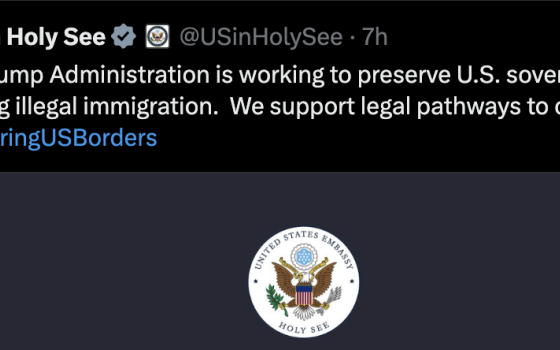By JOHN L. ALLEN JR.
Prague
In the court of popular opinion – certainly in the secularized Czech Republic, but to some extent everywhere – Christianity and its claim to transcendent truth are often seen as instruments of authority and control, inconsistent with a democratic spirit of freedom. Rejection of institutional religion by a broad swath of the population is often shaped, at least in part, by that root perception.
Across the former Soviet sphere, secularists often express the idea with a pithy phrase: “We didn’t overthrow the Reds just to submit to the Blacks,” they say, referring to clerical authority.
Pope Benedict XVI knows that impression all too well, which is probably why he devoted his address this evening before an audience of politicians and diplomats to a meditation on the relationship between freedom and truth. Reprising one of his classic themes, the pope argued that truth is not opposed to freedom, but rather is the door through which free people must choose to walk in order to realize the best versions of themselves.
In that sense, Benedict said, Christianity offers a key to “a new beginning, a new synthesis, and a renewal of hope.” The speech amounted to a classically Ratzingerian form of Christian humanism – if you like, a sort of Erasmus for the 21st century.
Benedict acknowledged, and applauded, the stirring for freedom that prompted the Velvet Revolution in 1989 and similar movements elsewhere, leading to the collapse of Communism. Yet freedom, the pope suggested, is not an end in itself.
“Freedom seeks purpose,” the pope said. “It requires conviction. True freedom presupposes the search for truth, for the true good, and hence finds its fulfillment precisely in knowing and doing what is right and just.”
“Goodness,” the pope said, “is freedom’s protection.”
For Christians, the pope said, freedom has a name – God – and a face in Jesus Christ. That name and that face, the pope said, are etched in the history of Europe.
“I wish to underline the irreplaceable role of Christianity for the formation of the conscience of each generation and the promotion of a basic ethical consensus that serves every person who calls this continent home,” the pope said.
Aware that secular opinion usually sees religious conviction as a source of division – since competing religious claims are essentially irreconcilable – Benedict argued that transcendent truth is actually a necessary condition of social harmony. That's a condition, he pointedly added, which a secular spirit of “tolerance” cannot deliver.
“Courage to articulate the truth in fact serves all members of society,” he said, “by shedding light on the path of human progress, indicating its ethical and moral foundations, and ensuring that public policy draws upon the treasury of human wisdom.”
“The pursuit of truth makes consensus possible,” the pope said. It “keeps public debate logical, honest and accountable, and ensures the unity which vague notions of integration simply cannot achieve.”
The alternative, the pope warned, is “cynicism which would deny the grandeur of our quest for truth” as well as “relativism that corrodes the very values which inspire the building of a united and fraternal world.”
All that, Benedict suggested, is rooted in "a disturbing sundering of the unity of goodness, truth and beauty and the consequent difficulty in finding an acceptance of common values."
In that sense, Benedict said, Christianity offers society “a more human and humanizing value” by virtue of defending “the nobility and breadth of the human spirit in its capacity to grasp the truth.”
The pope asserted that Christianity's vision of transcendent truth is reflected in the soaring architecture of Prague, which, as Benedict noted, is often dubbed "the heart of Europe."
Almost playing the part of a spiritual tour guide, Benedict added: "How tragic would it be if someone were to behold such examples of beauty, yet ignore the transcendent mystery to which they point."
The pope clearly seemed to want to distinguish his pitch from the stereotype many Czechs still hold of a Catholic church which seeks social privilege and to impose itself by force.
“In the end, truth does conquer, not by force but by persuasion,” the pope said. Truth prevails through “the heroic witness of men and women of firm principle” as well as by “sincere dialogue which looks beyond self-interest to the demands of the common good.”
Czech President Vaclav Klaus introduced Benedict XVI this afternoon, to an audience that also included former President Václav Havel, the dissident intellectual who led the Velvet Revolution and who served both as the last president of Czechoslovakia and the first president of the new Czech Republic.
Though Havel and Benedict XVI might have their differences at the level of social policy, they share a fair bit of metaphysical common ground. Havel's political philosophy is called "living in truth," coined in the context of the country's erstwhile Communist regime.
Later this afternoon, the pope will take part in a vespers service with the bishops of the Czech Republic. Tomorrow he travels to Brno, the most heavily Catholic region of the country, to celebrate a Mass at a regional airport expected to attract a crowd in excess of 100,000, swelled not just by Czechs but also bus- and trainloads of Slovaks, Poles, Austrians, and others.


